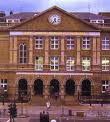Andrew Clark 1st Baronet 1826 –1893
June 05, 2010
 {::}**Sir Andrew Clark 1st
Baronet**
1826 –1893, Scottish physician and pathologist, was born at Aberdeen.
{::}**Sir Andrew Clark 1st
Baronet**
1826 –1893, Scottish physician and pathologist, was born at Aberdeen.
Andrew Clark was the allopathic doctor of William Ewert Gladstone, Thomas Henry Huxley, Charles Darwin, Alice James and Florence Nightingale’s sister,
The most explicit affirmation of Samuel Hahnemann’s teaching from orthodox sources was that made by Sir Andrew Clark in 1883 (Anon, The Pacific Coast Journal of Homeopathy, Volume 11, (1903). Page 216), who admitted that orthodox medicine was in a ’backward and unsatisfactory condition’ (Alfred Crosby Pope, David Dyce Brown, The Monthly Homeopathic Review vol. xxviii, (1884). Page 434), that ’there are no fixed principles for the treatment of disease’, and that ’(orthodox) medicine is the most unprincipled of sciences’ (John Henry Clarke, Homeopathy Explained, (originally printed 1905, reprinted by Nanopathy, 1 Jan 2001). Page 7 and page 11).
His predecessor Michel Granier had also admitted that orthodox medicine was in an anarchic state, but that homeopathy stood on an entirely different footing (Michel Granier, Conferences upon Homeopathy, (Leath and Ross, 1859)).
Andrew Clark was the assistant of John Hughes Bennett, who admitted that ’the empirical method of treating disease has reached its utmost limits, and that little further improvement is to be anticipated from it’ (Anon, The North American Journal of Homeopathy, Volume 15, (American Medical Union, 1867). Page 476), (John Hughes Bennett collected statistical evidence to show that orthodox treatment was worse than no treatment at all, publishing a series of cases of pneumonia treated without bleeding, antimony or mercury with unusually small mortality),
Andrew Clark found that the homeopathic remedy Nux Vomica was of great benefit in constipation, and it is possible this is the ’strychnine’ Charles Darwin complained about, during his treatment by Andrew Clark in 1874 ’… The diet proved impossible and his ‘strychnine’ preparation ‘did me harm’…’** ***(no doubt the Nux Vomica was given without sufficient dilution!) (J.J. Drysdale, M.D., [The British Journal of Homeopathy](http://books.google.co.uk/books?id=y_wEAAAAQAAJ&pg=PA175&dq=andrew+clark+homeopath&lr=&ei=rU4KTIK6PIb4ywSguKidBA&cd=27&redir_esc=y#v=onepage&q=andrew%20clarke&f=false), (1856). Page 175. See also Adrian J. Desmond, James Richard Moore, [Darwin*](http://books.google.co.uk/books?ei=jFAKTM-zM6XKzATt2NG5BQ&cd=3&id=BuLaAAAAMAAJ&dq=darwin&q=The+diet+proved+impossible+and+his+%27strychnine%27+preparation+%27did+me+harm%27&redir_esc=y#search_anchor), (Michael Joseph, 1991)).
Clark believed that ’faecal poisoning’ and ’auto intoxication by faecal products’ was often at the base of illhealth, and in this he took the lead from homeopathic thinking of the time (and today) (especially Edward Harris Ruddock) that constipation was commonly found at the root of illhealth. (Helen King, The Disease of Virgins: Green Sickness, Chlorosis and the Problems of Puberty, (Psychology Press, 2004). Page 96). Constipation was considered to be the main culprit in disease at this time. Edward Harris Ruddock preferred the bad diet explanation, as bread and butter was a staple dietary item at this time.
Andrew Clark also defended hypnotism,
From http://en.wikipedia.org/wiki/Sir_Andrew_Clark,_1st_Baronet After attending school in Aberdeen, Andrew Clark was sent by his guardians to Dundee, attending the High School of Dundee and was then apprenticed to a pharmacist; upon returning to Aberdeen he began his medical studies in the University there.
Soon, however, he went to Edinburgh, where in the extra-academical school he had a student’s career of the most brilliant description, ultimately becoming assistant to John Hughes Bennett in the Pathology Department of the Edinburgh Royal Infirmary, and assistant demonstrator of anatomy to Robert Knox.
But symptoms of tuberculosis brought his academic life to a close, and in the hope that the sea might benefit his health he joined the medical department of the Royal Navy in 1848.
Next year he became pathologist to the Haslar Hospital, where Thomas Henry Huxley was one of his colleagues, and in 1853 he was the successful candidate for the newly-instituted post of curator to the museum of the London Hospital.
There he intended to devote all his energies to pathology, but circumstances brought him into active medical practice.
In 1854, the year in which he took his doctor’s degree at Aberdeen, the post of assistant physician to the hospital became vacant and he was prevailed upon to apply for it. He was fond of telling how his tuberculosis tendencies gained him the appointment. “He is only a poor Scotch doctor,” it was said, “with but a few months to live; let him have it.” He had it, and two years before his death publicly declared that of those who were on the staff of the hospital at the time of his selection he was the only one remaining alive.
In 1854 he became a member of the Royal College of Physicians, and in 1858 a fellow, and then went in succession through all the offices of honour the College has to offer, ending in 1888 with the presidency, which he continued to hold till his death.
From the time of his selection as assistant physician to the London Hospital, his fame rapidly grew until he became a fashionable doctor with one of the largest practices in London, counting among his patients some of the most distinguished men of the day.
The great number of persons who passed through his consulting-room every morning rendered it inevitable that to a large extent his advice should become stereotyped and his prescriptions often reduced to mere stock formulae, but in really serious cases he was not to be surpassed in the skill and carefulness of his diagnosis and in his attention to detail.
He was created a baronet in 1883 in recognition of his services to medical science.
In spite of the claims of his practice he found time to produce a good many books, all written in the precise and polished style on which he used to pride himself. Doubtless owing largely to personal reasons, lung diseases and especially lung fibrosis formed his favourite theme, but he also discussed other subjects, such as kidney failure, anemia, constipation, etc.
He died in London, after a paralytic stroke.